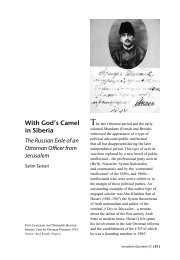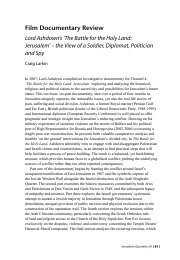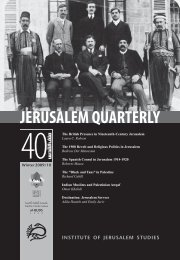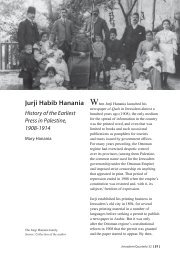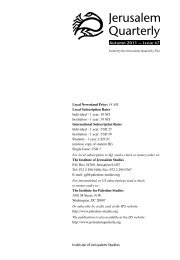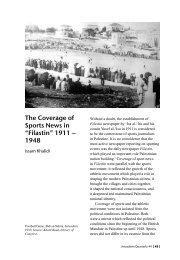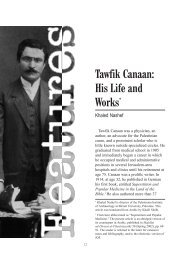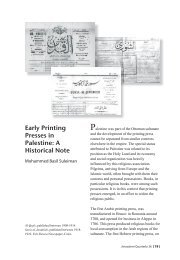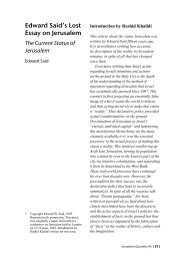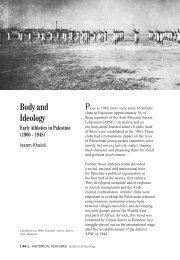PLUNDERING PALESTINE - Jerusalem Quarterly
PLUNDERING PALESTINE - Jerusalem Quarterly
PLUNDERING PALESTINE - Jerusalem Quarterly
Create successful ePaper yourself
Turn your PDF publications into a flip-book with our unique Google optimized e-Paper software.
In interviews conducted as part of my recent study of the looting of archaeological<br />
sites and the trade in antiquities in the region, less than half the respondents support<br />
a legal trade. And that faction consisted primarily of dealers and collectors–the<br />
same interest groups in Israel that were influential during the drafting of the 1978<br />
Antiquities Law and whom are involved in the draft legislation in Palestine. Some<br />
supporters proffered the ‘art as ambassador’ position, arguing that by “allowing people<br />
to collect increases our general knowledge, which may in turn lead to greater financial<br />
support of archaeological endeavours in the region” (Dealer 1). Other dealers argued<br />
“If people want to buy a reminder of their trip to the Holy Land, then we should<br />
supply it to them and in turn we can make a living” (Dealer 13). “If I didn’t sell this<br />
material people would still loot archaeological sites and someone else would come<br />
along and get a license and sell the stuff to a tourist from America” (Dealer 29). So,<br />
who owns the past? According to the archival material and recent interviews, the<br />
answer is the State. And, it was and is the duty of the state to protect the cultural<br />
heritage for the future.<br />
While the legislative legacies of the region are historically deep-rooted, the jury is<br />
still out on how best to protect artefacts and archaeological sites that are threatened as<br />
a result of the unbridled demand for relics from the region. Through an examination<br />
of archival materials, recent oral histories, and an historical analysis of the legal<br />
precedents in the region, it is not difficult to see why a legal trade exists despite<br />
evidence indicating a direct link to the looting of archaeological sites. As Palestine<br />
prepares to implement a new set of laws, now is the time to reflect on the historical<br />
motives and current initiatives in the hope that legislative legacies and the status quo<br />
will not dictate the protection of cultural heritage. Instead a thoughtful examination of<br />
what is best for the cultural legacy of Palestine will prevail.<br />
Morag Kersel is a Social Sciences and Humanities Research Council of Canada postdoctoral<br />
fellow in the Department of Anthropology at the University of Toronto. This article is derived from<br />
her PhD thesis at the University of Cambridge, License to Sell: The Legal Trade of Antiquities<br />
in Israel (2006).<br />
[ 36 ] FEATURES The Trade in Palestinian Antiquities



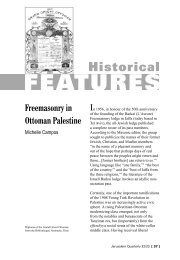
![In Search of Jerusalem Airport [pdf] - Jerusalem Quarterly](https://img.yumpu.com/49007736/1/180x260/in-search-of-jerusalem-airport-pdf-jerusalem-quarterly.jpg?quality=85)

